Justin Constantine’s (’92) collective power
The legacy of an American hero
Featured Stories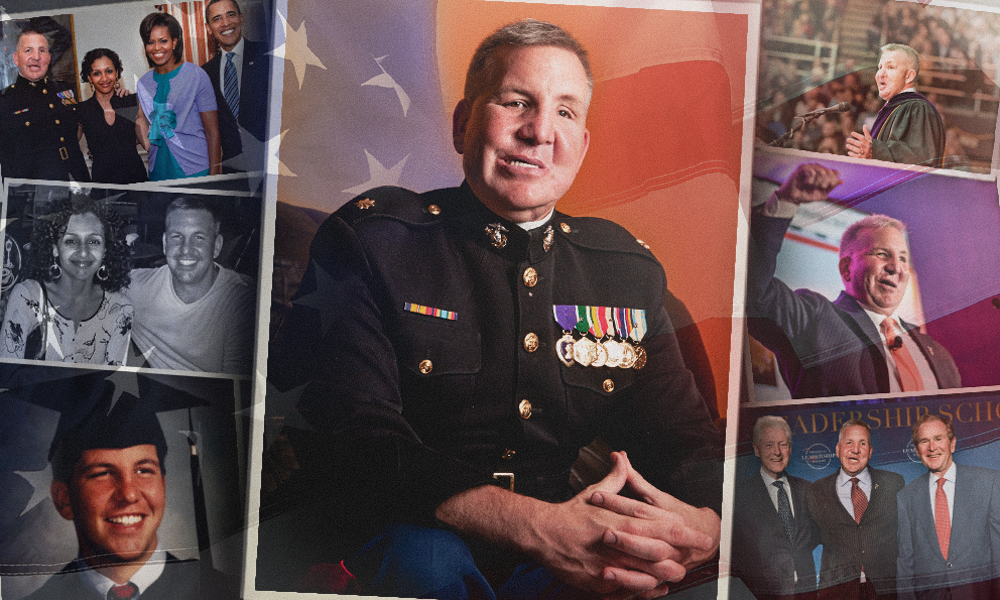
SUMMARY: The world met Lt. Col. Justin Constantine (’92) after he survived a gunshot to the head while serving in Iraq. But his Madison family knew him long before, as a connector who drew others in with a unique combination of laugh-out-loud candor, grit and dedication to empowering others. After he passed in 2022, his wife, Dahlia, created a scholarship for first-generation students at JMU to continue Justin’s legacy of giving others first and second chances. This year, it was awarded to first-year student Samantha Cornell (’28), who is working toward a career as a nurse.
Hear more episodes and subscribe to the podcast at the Being the Change podcast page.
A ‘renaissance man’ in the making
Before he was an American hero, Justin Constantine was a boy who rode bikes in his neighborhood. The son of a first-generation Romanian immigrant, Justin grew up between Europe and Fairfax, Virginia. Friends say he was whip-smart and quick-witted—a competitive diver who voluntarily enrolled in summer school to get ahead in his studies. He was his own person, had his own convictions. And he always had a job.
At JMU, Justin was a renaissance man in the making. He studied English and political science, minored in German, and rushed Kappa Sigma. Fraternity brothers say he often made and gifted them mix CDs, which they still have somewhere.
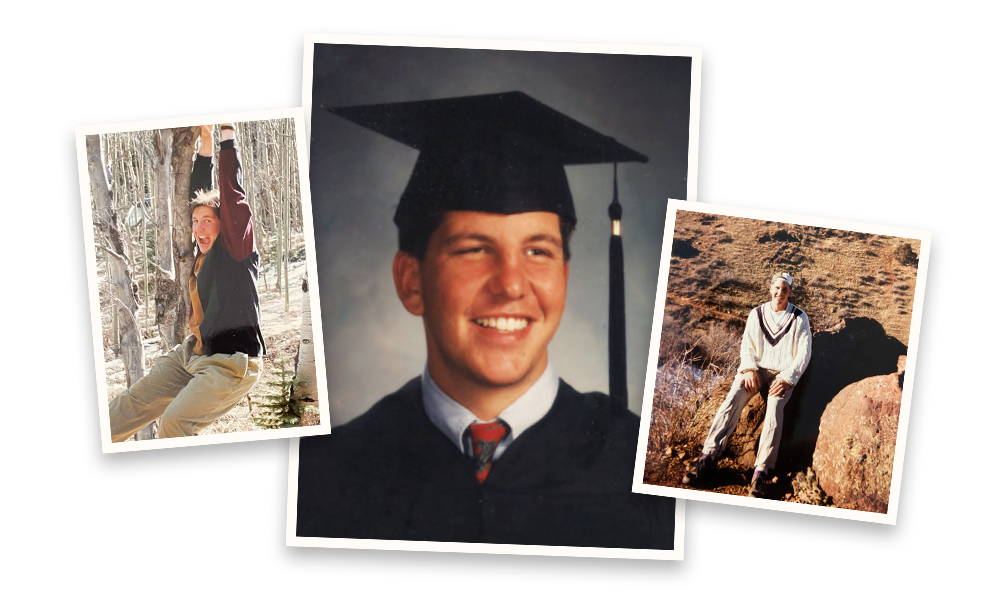
“I think we just connected at kind of a different level,” said fraternity brother Steve George (’93). “Music was something that kept us connected. He pushed me into directions and areas that I didn't have as much exposure to, so I always enjoyed that.”
Justin also played fly-half for JMU Rugby, where he met Michael Murphy (’92). “[Fly-half] is a super important position,” said Murphy, now head rugby coach at George Mason University. “But then there can be entire games where your fly-half never makes a tackle.”
This variability created ripe opportunities for ribbing between the two. They often competed to make the other laugh, ramping up the absurdity until one finally broke. “We just clicked in terms of similar personalities and views of the world,” Murphy said.
One time, a teammate’s father helped coach practice and unwittingly sparked a lifelong joke. Talking through a play, he gestured toward Justin and said, “Then, just pass the ball—you got a big hoss of a fly-half.”
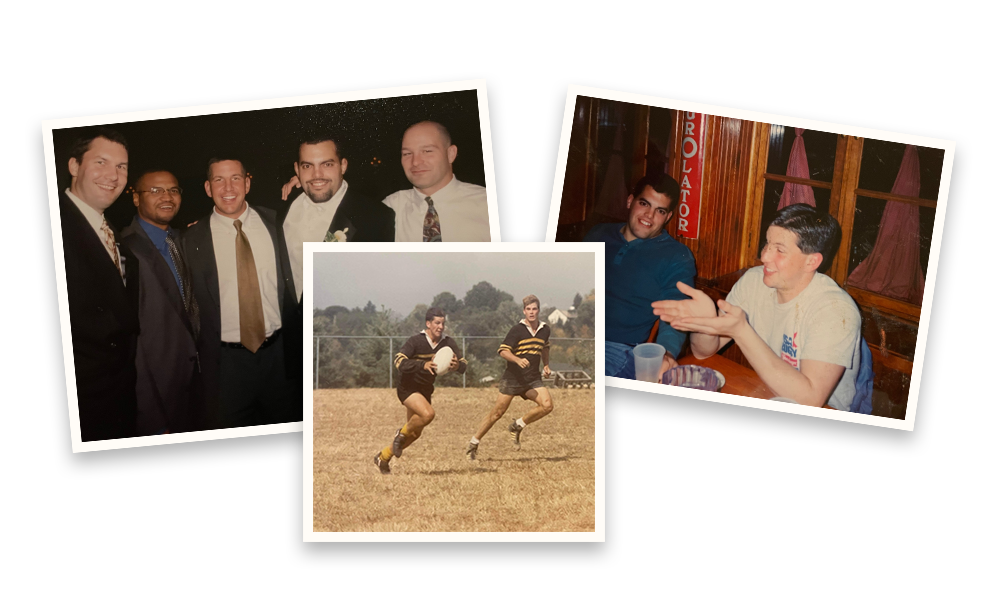
“He just loved that,” Murphy said. “Anything that we could connect… Say, he stumbled over something. He’d say, ‘I’m a big hoss. You can’t expect me to be coordinated.’”
Those six words became a refrain in their 35-year friendship. “I think in the weeks before he died, he made a big hoss comment,” Murphy said. Even from his hospital bed: “Like, ‘Don’t forget—I’m a big hoss.’”
Joining the Marines—and staying alive
After graduation, Justin lived with his parents, worked and played rugby with Murphy in Northern Virginia. Then he attended law school at the University of Denver. In his second year, he joined the Marine Corps, continuing a proud family legacy. His maternal grandfather served with Sen. Bob Dole in the 10th Mountain Division during World War II, and his father and brother served in the Air Force.
“[Joining the Marine Corps] was a big move, needless to say, but he was excited,” George said, “because he really wanted to accelerate his learning and his experience level now that he had his law degree—to really get trial experience earlier.”
Justin practiced in the Marine Corps as a criminal defense counselor and prosecutor. Then, in spring 2006, he took three weeks of leave to attend a Spanish immersion class in Buenos Aires, Argentina. Dahlia Hamza, an Egyptian American educator and children’s book author, had the same idea.
On that day, Dahlia was the only student in class. “And then he walks in,” she said. “And I was like, ‘This guy is going to take over my private lessons.’”
Their first date was at the end of that week—“and I didn’t even know it was a date,” she said. Justin tagged along with Dahlia and some friends who were going to an American sports bar to watch the NCAA basketball tournament. But a mistranslation brought them all to a fancy Italian restaurant instead, with a small black-and-white TV in the corner.
“It was like a movie,” Dahlia said.
Slowly, people from their large group left, until it was only Justin and Dahlia talking for hours. “It was just so instant—like we had just known each other forever,” she said. When Justin returned to the United States three weeks later, their connection was a simple fact. “We just knew we were together.”
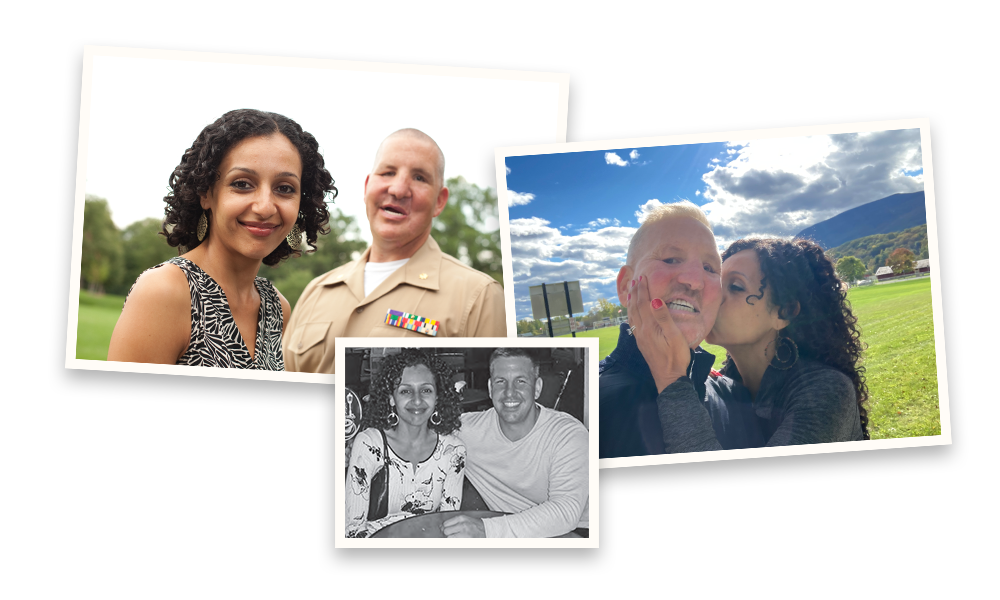
In September, Justin deployed to Iraq to serve as a civil affairs team leader, and Dahlia moved to Cambridge, England, to complete her doctoral degree. “We went from vacation romance to long-distance to epic war drama, really, in a matter of months.”
On Oct. 18, 2006, six weeks into his deployment, Justin was leading a small team of Marines and Navy corpsmen on a patrol through an area with a known sniper. One second after instructing a reporter to keep moving to minimize risk, Justin was shot in the back of the head.
When his body was turned over, the declaration was made that he had been killed in action—but a courageous Navy corpsman decided to act anyway. “Fortunately for me, Corpsman George Grant is an incredible young man,” Justin said in a TEDx talk in 2015. “In the face of overwhelming adversity and with complete disregard for his own life, George was able to focus solely on me and keep me alive.”
While Justin received rescue breathing and an emergency tracheotomy, Dahlia refreshed her email in Cambridge. “I woke up in the morning and I was expecting a message from him, and there was nothing,” she said. “I thought, well, maybe the communications are down … but I just had a weird feeling in my stomach.”
She caught a cab to a conference and passed by a cemetery. “Normally, I love cemeteries,” she said. “I just think they’re beautiful places for stories.” But today, there was a different feeling. She asked the driver about the gravesite, and he told her it was the American cemetery for World War II.
“In that moment, I knew something had happened,” she said.
That night, the email finally arrived from Justin’s mother. The subject line read: “Justin is okay.” Within 48 hours, Dahlia was at his bedside in Landstuhl, Germany. She never left.
Ongoing recovery and advocacy
Justin and Dahlia were married at the Marine Corps Museum at Quantico in 2008, surrounded by family and friends, including the Navy corpsman who saved Justin’s life.
“I’d say ‘impressed’ is the understatement of the day,” George said. “You see the crowd and the folks that are there supporting him—this guy I have known since I was 18 years old—and this is just up until the point where he was getting married.”
Over the next 14 years, Justin’s recovery remained ongoing—and so did his advocacy. He worked with the Department of Justice, served on the U.S. Senate Committee on Veterans’ Affairs, earned a Master of Laws (LL.M.) in national security, co-founded a nonprofit, published two books and received numerous honors. He was a Presidential Leadership Scholar, a Champion of Change for Veterans under President Barack Obama, and one of the wounded warriors painted by President George W. Bush in Portraits of Courage.
He also kept in touch with friends. “We just had a bond that we created from an undergraduate standpoint,” George said. “It was one of those connections that was a little deeper … and compelled us to put in the effort to stay connected.”
From the TEDx stage, Justin described how his injury had changed him. “I can’t see out of my left eye. I can’t run anymore … I’m also missing most of my teeth and the end of my tongue. I can’t speak perfectly clearly. I also suffer from post-traumatic stress and a traumatic brain injury.”
“But you know what? I’m the luckiest person you’ll ever meet.”
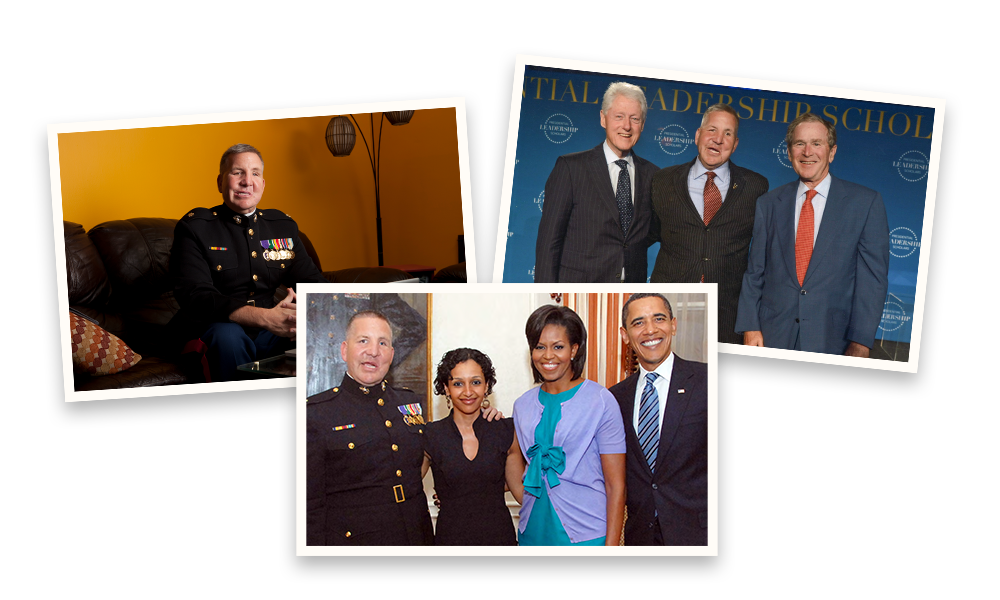 Friends say it wasn’t a pat statement but a deeply held conviction. “He would say that he felt so lucky,” Murphy said, “that he was an officer and had family nearby when he went through all this.”
Friends say it wasn’t a pat statement but a deeply held conviction. “He would say that he felt so lucky,” Murphy said, “that he was an officer and had family nearby when he went through all this.”
“What I took away from my conversations with Justin was how brave he was, how strong he was, yet still how real he was through the process,” George said.
From Justin’s perspective, his injury didn’t just take—it gave, too. “I’m now far closer with my wife than I would have ever imagined … and I know that I’m far stronger than I would have ever thought possible,” he said. “Now I can put everyday problems in their proper perspective so I can focus on what’s truly important to Dahlia and me.”
In 2020, Justin was diagnosed with stage 4 prostate cancer. His final two years were spent in pursuit of healing. “With every challenge Justin faced, including his last battle with cancer,” Dahlia said, “he seemed to evolve and become more of the person he was always meant to be.”
Justin’s legacy
Friends from JMU created a GoFundMe to support Justin’s cancer treatments, which went viral after media personality Eric Sollenberger (’07), known as PFT Commenter, shared it. Overwhelmed by the support of the Madison community, his Marine Corps family and even strangers, Justin wrote in March 2022:
“How can I thank so many people at one time? If I could do something larger and grander I would, but I hope that everyone knows just how appreciative we are of the overwhelming support.”
Two months later, Justin passed away at 52. The nation mourned an American hero, while those closest to him grieved the loss of a devoted husband, brother, son and friend; a decorated Marine; a renaissance man; a maker of mix CDs; and a big hoss of a fly-half.
“I never really thought of, or cared about, Justin as some kind of national hero icon,” Murphy said. “I mean … he was just my friend, Justin.”
With the remaining GoFundMe money, Dahlia turned to JMU. “The fact that it was started by JMU friends meant a lot to me,” she said. “That’s why I wanted the money to go back there.”
In 2023, Dahlia created the Lt. Col. Justin Constantine ('92) Scholarship Endowment for First-Generation Students. “I think it was in both of us—the idea of supporting other people—because we recognized how much we were supported,” she said. “And first-gen was a big thing for Justin. His dad is a first-gen college student.”
This year, the scholarship was awarded to first-year Honors student Samantha Cornell (’28), who is pursuing Nursing at JMU. She and Dahlia met ahead of their presentation at the 34th Annual Stewardship Luncheon. They were joined by another key figure in Justin’s story: Rachel Fletcher (’05), the JMU nurse who cared for Justin at the National Naval Medical Center. Fletcher traveled from Iowa to attend and connect with Dahlia and Cornell on campus.
 “That was Justin’s superpower,” Dahlia said. “To gather people. He was constantly forming new communities.”
“That was Justin’s superpower,” Dahlia said. “To gather people. He was constantly forming new communities.”
A hero’s journey often follows an individual who looks inward to overcome a great challenge. But that is not the story of the late American hero Lt. Col. Justin Constantine. Justin believed—and modeled—that true triumph requires a community of support.
“The way he narrated his own story, he was always about the collective around him,” Dahlia said.
In one of his final speeches in 2022, Justin spoke about humanity's great need for one another. He said: “In America, we have a myth about the self-made person, and it’s often coupled with a rags-to-riches story, where any individual, despite all odds, can achieve dizzying levels of success all on their own."
“I think a much more powerful and impactful philosophy is to surround yourself with good people, who all bring different gifts to the table.”

